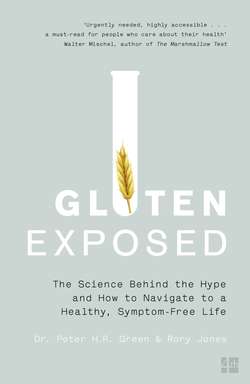Читать книгу Gluten Exposed: The Science Behind the Hype and How to Navigate to a Healthy, Symptom-free Life - Rory Jones, Dr. Green Peter - Страница 20
When Your Doctor Advises Vitamin or Mineral Supplements
ОглавлениеVitamin deficiencies are often found in people with newly diagnosed celiac disease and require supplementation until the gut has healed and can absorb nutrients properly, and the deficiency is resolved. Anyone on a restricted diet or with another GI condition that involves malabsorption is also a candidate for supplementation.
We recommend choosing a gluten-free vitamin that has only the regulated amounts of vitamins. Try to avoid multivitamins that have megadoses of anything.
People who eat processed food are most likely getting their vitamins synthetically to begin with. Milk, fortified with vitamin D, is the primary source of D for most people who avoid the sun. Ironically, cereals, breads, flours, and canned foods all are fortified to replace the vitamins and minerals removed by processing. But manufacturers have just begun to fortify gluten-free foods, and this can pose problems for someone who has grown accustomed to obtaining their vitamins synthetically from processed food and is now on a gluten-free diet.
The pendulum can easily swing in the other direction. Many people still take megadoses of vitamins, assuming that if some is good, more must be better. We see more people with vitamin B6 toxicity than deficiency, due to excess supplementation.
Vitamin B6 (pyridoxine) is involved in many metabolic functions throughout the body. It is needed for brain development and function and involved in the process of making serotonin and norepinephrine, chemical transmitters in the brain. Although vitamin B6 is often promoted for “nervous system health,” its toxicity is usually focused on the nervous system. A vitamin B6 deficiency is rare in the general population since it is found in many foods.
